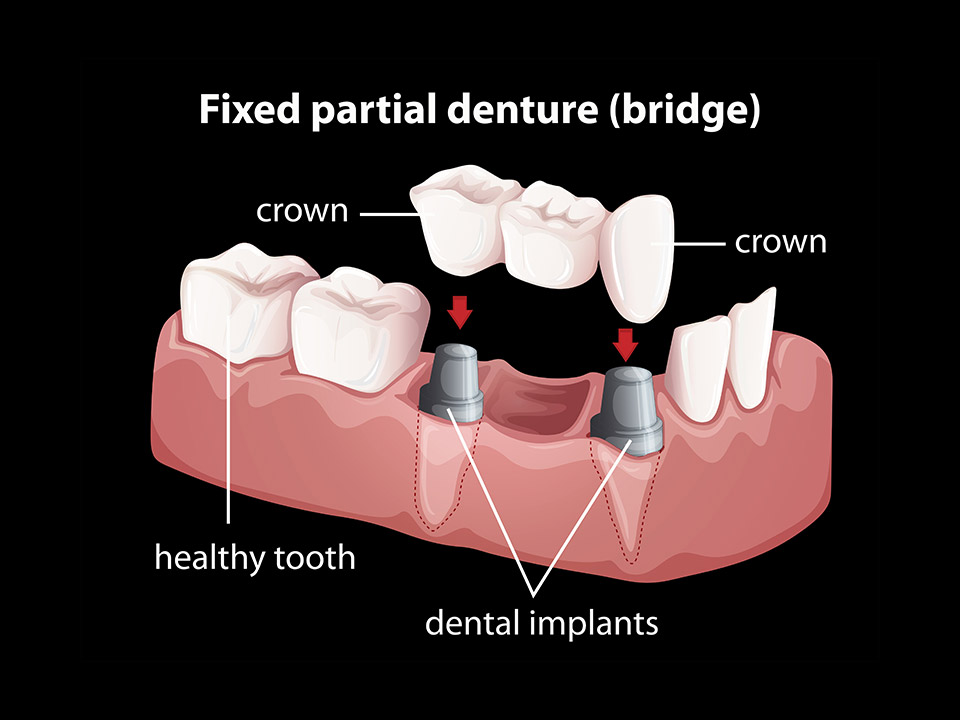Dental implants or bridges are the most popular teeth restoration options. While both restoration options can accomplish similar tasks, they are entirely different tools. In some situations, implants tend to be more beneficial than bridges. Here is everything you need to know about these two options.
Dental Implants
A dental implant is an artificial tooth root secured in place of a lost tooth and is often made of titanium. The implant is fitted with a temporary cover screw while integrating with the jawbone through the osseointegration process.
This procedure may take about six months to complete but results in an exceptionally durable and stable prosthetic.
Following successful osseointegration, a temporary crown is used in place of the protective covering. This acts as a guide around which the gum grows and takes shape. Replacing the temporary crown with a permanent one completes the procedure.
The Procedure
A dental implant procedure is quite complex. Before taking diagnostic pictures that include a cone beam CT scan, a dentist must determine whether you are a good candidate for implant treatment. Doctors use this scan to evaluate your jawbone’s condition and plan each treatment stage.
A single dental implant is usually implanted during a quick surgery that lasts about an hour. If you are anxious, sedative options can put you at ease. Once complete, doctors can attach a temporary tooth to the implant while it heals. This process usually takes about three to six months. After the implant has healed, you go back to your dentist to receive a new implant crown.
Pros and Cons of Dental Implants
Pros
- Durable with little maintenance
- Retain a natural appearance
- Implants are not as detrimental to oral health
- You can replace as many teeth as you want
- Cost-effective
Cons
- Time-consuming. The entire process can last up to six months
- Higher upfront costs
- May result in surgical complications
- Less likely to be covered by insurance
Dental Bridges
Dental bridges can be more invasive than dental implants. In contrast to implants, bridges do not replace the tooth root. They instead use adjacent teeth as a base to attach a crown that can replace the gap left by a missing tooth.
While the procedure is more invasive by requiring permanent modification of nearby teeth to back the bridge, it is not nearly as time-consuming as the implant process (which also involves osseointegration). As the name suggests, a dental bridge spans the space left by a lost tooth.
Therefore, the dentist grinds one or more nearby teeth to serve as the anchor for a restoration.
The Procedure
A dental bridge procedure does not require surgery and often takes a few weeks to complete. The abutment teeth are sculpted and ground so they can support dental crowns.
Following the proper shaping of teeth, doctors take a precise dental impression to send to their lab, where they make your bridge according to their design and requirements.
A temporary restorative is placed to safeguard the prepared teeth and to ensure you can speak and eat comfortably. When your bridge is ready, the experts install it and check for necessary changes before cementing it in place firmly.
Pros and Cons of Dental Bridges
Pros
- Less time-consuming
- Do not require invasive surgery or bone grafting
- Cheaper than implant
- Lower upfront cost than a dental implant
- Requires only two visits to a dentist
Cons
- Will not last long
- Replacement needs to be done every 5 to 7 years, with a possible extension
- Do not correct bone loss. Unlike implants that are screwed into jawbones for support, bridges have no roots. They sit on the lines of gum, hence
- increasing the chances of bone loss.
- It can damage healthy teeth surrounding the missing tooth
- More tooth decay and cavities in neighboring teeth with implants
Dental Implants Vs. Dental Bridges Applications
We have compiled an application list for each to better understand how these two dental procedures differ.
Dental Implants
- You may opt for a dental implant if you:
- Have non-consecutive multiple missing teeth
- Want to replace the entire dental unit, from root to crown
- Want a less invasive restoration option
- Want a long-term replacement option with a higher survival rate
Dental Bridge
- A dental bridge is ideal for anyone who:
- Is missing more than one successive tooth
- Wants a cost-effective treatment option for a whole month or several tooth restorations
- Has damaged or healthy adjacent teeth to support the bridge
Dental Implants Vs. Dental Bridges: Which Is the Best Option for You?
The best restoration option for you depends on specific individual factors, such as the number of teeth missing, your budget, and overall health. Usually, your dentist will recommend the ideal tooth replacement option depending on your needs.
Cost-Wise
Regarding prices, dental implant and bridge discussion yields a slight difference. Dental implant tends to be more costly than dental bridges. But despite the cost, they last longer, making it worth the price.
Health-Wise
Since dental implants require surgery, they might not be suitable for people with such conditions as leukemia and diabetes, which slow down the healing process.
A dental implant is a perfect option for candidates in good overall health with a strong jawbone free of cavities.
Treatment Length
Tooth implants take approximately two to six months and sometimes even beyond.
On the other hand, bridge installation takes a couple of weeks, and the process requires only two dental visits and is quicker.
Number of Missing Teeth
An implant may not be the best treatment option for candidates missing multiple teeth in a row. Each missing tooth requires a different implant to be surgically affixed to your jawbone, which requires costly and often unnecessary surgery.
Conclusion
Dental bridges and implants are the two basic methods for replacing missing teeth. Your choice depends on your preferences, budget, needs, desired level of durability, and treatment process.
If you want to replace your missing tooth, a dental implant is your best choice since it lasts longer and is not detrimental to your oral health. You can also replace as many teeth as you want. Yet, the best approach would be to book a consultation with your local dental clinic. A dentist will carefully examine your mouth and teeth and recommend the best treatment option.







